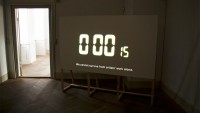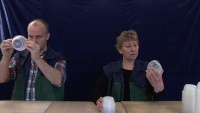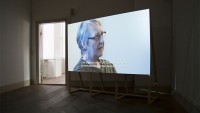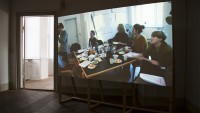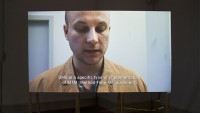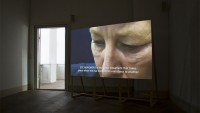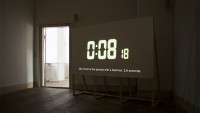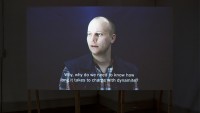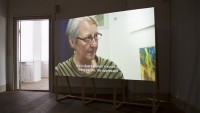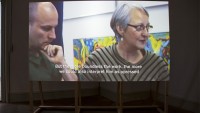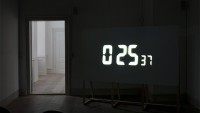Fifty Minutes in Half an Hour (Halvtreds minutter på en halv time)
Video, 50 minutes, 16:9. Kajsa Dahlberg 2013
The video Fifty Minutes in Half an Hour sets out to investigate how attitudes towards work have changed over time. The point of departure is a number of radio programmes from the National Broadcasting Corporation’s radio archive about Haustrups Fabrikker (Haustrup’s Factories) in Odense, Denmark. Haustrups Fabrikker was founded as a family-run business in 1914 and has since been through a number of mergers, buy-ups and transformations, which broadly reflect the globalisation process of recent decades. Today, an international company owns the factory, and manufacturing has been outsourced to China, South Korea, and Central America.
For this work, I have been collaborated with the consulting company Dacapo from Odense and used actors to stage a history about the working culture of manual labour. Since 1995 Dacapo has used Forum theatre to stimulate improved communication between management and employees in both private and public companies. Developed by Brazilian theatre director, author, and politician Augusto Boal, Forum theatre ultimately aimed to overcome oppression. By facilitating negotiation between actors and audience, Forum theatre encourages the audience to transform or even take up the performance themselves. The purpose is to provide the participants with tools to influence or transform their own lives.
Fifty Minutes in Half an Hour is shot in Dacapo’s office in Odense, where Dacapo’s founder, three actors, three cultural workers and myself met in early January 2013. The starting point for the video’s discussions and enactments was a number of scenarios about working conditions from a series of radio programmes about Haustrup’s Fabrikker.
In different ways, all the scenarios are concerned with the negotiation of time and this aspect is also reflected in the composition of the video. One scenario engages with the UMS piecework system, which was introduced into the European industry in the 1960s. UMS marked a radical shift in attitudes towards manual labour by focusing, not on human beings themselves, but on the efficiency of their movements. The second scenario pursues the problems of industrial automation, while the third focuses on the globalisation of labour, involving the outsourcing of manufacturing processes to countries with lower labour costs. The fourth scenario is concerned the erosion of the boundaries between work and leisure.
The outcome is an attempt to understand and embody the working culture of manual labour. While the scenarios about labour are discussed and enacted, the video is equally concerned with rendering the means of art production visible.
Participants:
Lone Thellesen, director and consultant, Dacapo
Nanna Kaarsberg, actress, Dacapo
Jennie Nielsen, actress and consultant, Dacapo
Rasmus Søndergaard, freelance actor, Dacapo
Kajsa Dahlberg, artist
Gritt Uldall-Jessen, playwright, activist and project dramaturg
Mia Edelgart, artist and project assistant
Trine Friis Sørensen, curator
Photo: Andreas Brink Pedersen and Paolo Iskra
Editing: Simon Möller and Kajsa Dahlberg
Colour correction: Simon Möller
Sound adjustment: Ask Kæreby
Translator: Klara Jaya Brekke
The author Ninna Assentoft Rasmussen wrote a paper about the project called Tilskueren og kunstens kritiske potentiale -Om Jacques Rancières emanciperede tilskuer during her Literary Science studies in Copenhagen.
